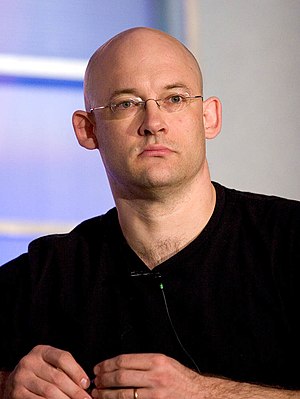
“Operationally, the transactions were fairly trivial.”
Share this quote:
“You know youve got a good piece of software when people use it for purposes for which the designers never intended or designed for.”
Share this quote:
“Anyone who has his e-mail client notify him anytime an e-mail comes in has already lost.”
Share this quote:
“We demonstrated the exchange of clinical information, by using a critical set of common, open technical standards.”
Share this quote:
When we change the way we communicate, we change society
Share this quote:
Tragedy of the Commons: while each person can agree that all would benefit from common restraint, the incentives of the individuals are arrayed against that outcome.
Share this quote:
The centrality of group effort to human life means that anything that changes the way groups function will have profound ramifications for everything from commerce and government to media and religion.
Share this quote:
[N]ew technology enables new kinds of group-forming.
Share this quote:
Unlike sharing, where the group is mainly an aggregate of participants, cooperating creates group identity.
Share this quote:
In a profession, members are only partly guided by service to the public.
Share this quote:
[B]ecause the minimum costs of being an organization in the first place are relatively high, certain activities may have some value but not enough to make them worth pursuing in any organized way. New social tools are altering this equation by lowering the costs of coordinating group action.
Share this quote:
[F]rom now on, the act of creating and circulating evidence of wrongdoing to more than a few people, even if they all work together, will be seen as a delayed but public act.
Share this quote:
Sharing thoughts and expressions and even actions with others, possibly many others, is becoming a normal opportunity, not just for professionals and experts but for anyone who wants it. This opportunity can work on scales and over duration that were previously unimaginable. Unlike personal or communal value, public value requires not just new opportunities for old motivations; it requires governance, which is to say ways of discouraging or preventing people from wrecking either the process or the product of the group.
Share this quote:
Upgrading ones imagination about what is possible is always a leap of faith.
Share this quote:
Personal value is the kind of value we receive from being active instead of passive, creative instead of consumptive.
Share this quote:
How we treat one another matters, and not just in a its nice to be nice kind of way: our behavior contributes to an environment that encourages some opportunities and hinders others.
Share this quote:
Public and civic value require commitment and hard work among the core group of participants. It also requires that these groups be self-governing and submit to constraints that help them ignore distracting and entertaining material and stay focused instead of some sophisticated task.
Share this quote:
This work is not easy, and it never goes smoothly. Because we are hopelessly committed to both individual and group effectiveness, groups committed to public or civic value are rarely permanent. Instead, groups need to acquire a culture that rewards their members for doing that hard work. It takes this kind of group effort to get what we need, not just what we want; understanding how to create and maintain is one of the great challenges of our era.
Share this quote:
People want to do something to make the world a better place. They will help when they are invited to.
Share this quote:
Communications tools dont get socially interesting until they get technologically boring.
Share this quote: